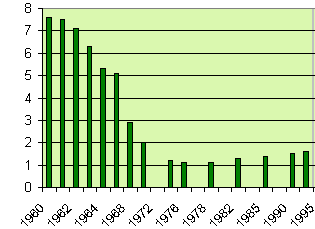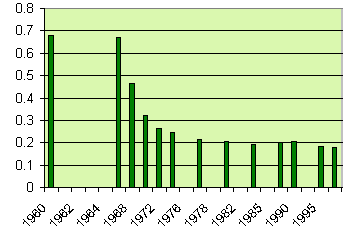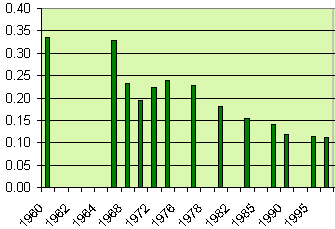Mark Liberman at Language Log mentions the role Latin and Greek used to play in education (Old school), which is as good an excuse as any to post some graphs I made a few weeks ago from data (not current, alas) on Latin and Greek Enrollments in America’s Schools and Colleges. (I’m trying to post my backlog before Chinese New Year. And maybe then I can finally answer all the mail and comments that have been piling up.)
Note that these are not to scale with each other.
Latin as a Percentage of Enrollments, Grades 9-12

Latin, as a Percentage of College Enrollments

Greek, as a Percentage of College Enrollments

The numbers appear different in another paper from the same source: Foreign Language Enrollments in United States Institutions of Higher Education, Fall 2002 (PDF). This also gives data for many other languages.
I was going to have this lead into a discussion on the role of Classical Chinese in education in Taiwan, but I’m too far behind. So this makes two entries in a row without a direct tie-in to this site’s theme. Sorry about that.

Though Classical Chinese and Modern Chinese are very different, I feel the difference in Latin and Greek to English is even greater. Wouldn’t a better comparison be Classical (or Modern) Chinese education in Korea or Japan? I would be interested in knowing how those numbers add up.
Actually, in Japan, classical Chinese (and classical Japanese) are required subjects in high school. (Well, not really CC — “kanbun”, which is basically CC texts marked-up, reordered, and read as quasi-Japanese.)
Even if there were to be a revival of interest in Latin, there would be a short term deficit of teachers.
There is still a definite interest in the language, however, as is borne out by the steadily growing number of people using the Latinum podcast, which offers online free downloadable lessons in Latin, using a language lab type methodology to teach it, with the emphasis on speaking.
http://latinum.mypodcast.com
I’m a British writer who loves Latin and I am bringing out a book in the US in November about Latin, called Carpe Diem – How to Become a Latin Lover. Have you got any idea how many people in America have done any Latin? And where are the great places to study? Prep schools? Catholic schools? Thanks so much.
Harry Mount (London)